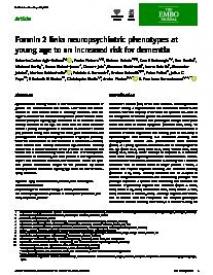Formin 2 links neuropsychiatric phenotypes at young age to an increased risk for dementia
Age-associated memory decline is due to variable combinations of genetic and environmental risk factors. How these risk factors interact to drive disease onset is currently unknown.
Here we begin to elucidate the mechanisms by which post-traumatic stress disorder (PTSD) at a young age contributes to an increased risk to develop dementia at old age.
We show that the actin nucleator Formin 2 (Fmn2) is deregulated in PTSD and in Alzheimer’s disease (AD) patients.
Young mice lacking the Fmn2 gene exhibit PTSD-like phenotypes and corresponding impairments of synaptic plasticity, while the consolidation of new memories is unaffected.
However, Fmn2 mutant mice develop accelerated age-associated memory decline that is further increased in the resence of additional risk factors and is mechanistically linked to a loss of transcriptional homeostasis.
In conclusion, our data present a new approach to explore the connection between AD risk factors across life span and provide mechanistic insight to the processes by which neuropsychiatric diseases at a young age affect the risk for developing dementia.
In: The EMBO Journal, ISSN 1460-2075 | 36 | 19 | 2815-2828
http://doi.org/10.15252/embj.201796821


